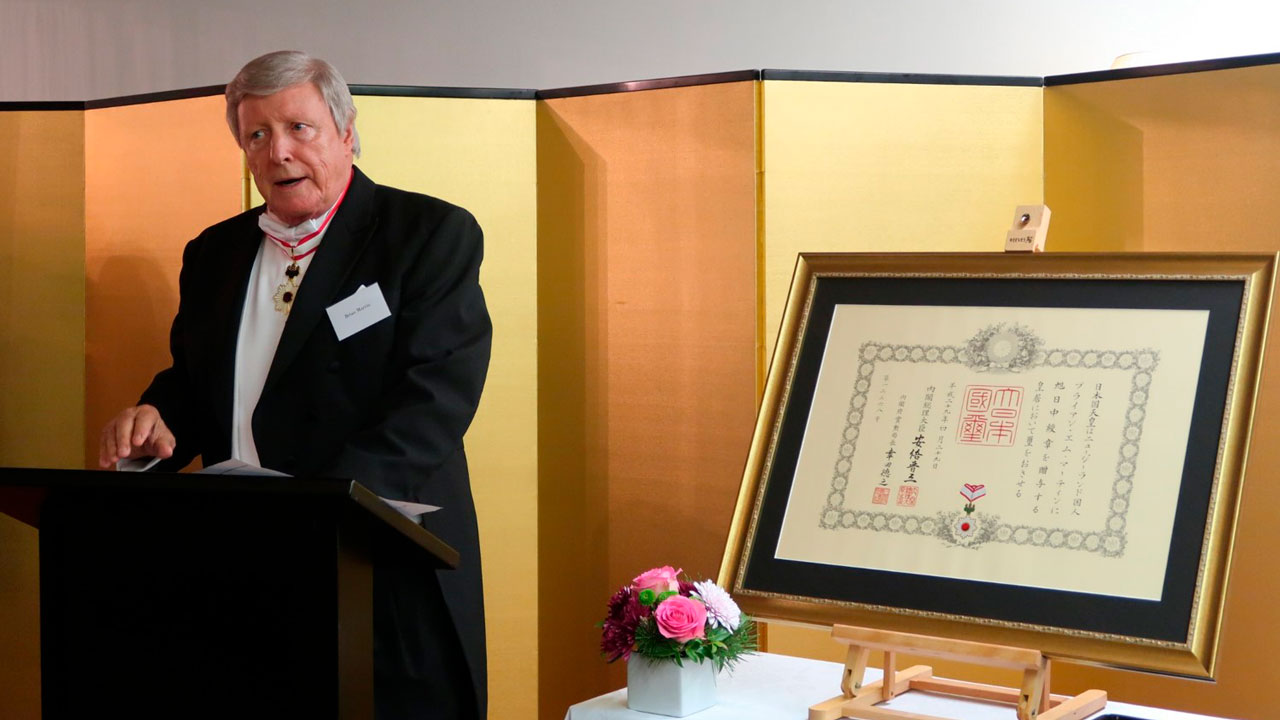The Second World War was the greatest conflict to ever engulf the world and has shaped much of the way we have lived ever since. It was one of the drivers that helped develop New Zealand’s confidence and its identity.
It was also the start of the story of the Institute of Management New Zealand, which began soon after World War II. The Institute was created to educate the men and women returning from the war so that they could be reintegrated into society and start rebuilding their lives on home ground.
The war also brought foreigners and immigrants to our shores. One of them a longstanding IMNZ fellow, Brian Martin who first laid eyes on Aotearoa or the land of the long white cloud from the deck of a British naval ship. He immediately knew that this was the country of milk and honey, the home of his future. The teenager returned shortly after the war with £18 in his pocket and a heart filled with dreams.
Now 80 years old, Brian Martin has had a very interesting life. Sitting in his home in Silverdale on the North Shore with the clear-cut melodies from a classical jazz compilation playing softly in the background, I am astounded at the rich history of his life and career all around us. Thoughts of possibility and hope drifting in with the sun through the window from the lush green garden that stretches as far as the eye can see.
There’s a playful glint in his eyes as he confidently tells me that anything is possible as long as there’s music and dancing; and he firmly believes dancing like Michael Jackson is the key!
2017 was a highlight year for the IMNZ Fellow and New Zealand businessman. He was awarded the ‘The Honour of the Rising Sun with Golden Rays’ by the Emperor of Japan for developing and expanding trade and deeper relationships between Japan and New Zealand. The award is a great accomplishment as he is only the second New Zealander ever to receive this honour, which is Japan’s highest honour.
The award is the pinnacle of a life lived and a legacy built with hard work, facing challenges head-on and relishing in the highlight moments of accomplishment, but I wonder, where exactly did his drive and passion start?
With much nostalgia in his tone he confirms that it is all thanks to the support of loving parents and an entrepeneurial spirit. Seven-year old Brian Martin made his first quid in post-war England, by picking up apples and selling them to the German POW’s. His true business acumen was kick-started as a teenager washing boats, selling fish and trying his hand as a cobbler in London before he joined the Navy.
For any WW soldier it is hard to see past enemy lines, which for young Brian was the Japanese. Coming face to face with the culture and the people his father had fought was daunting, but his own first true encounter with a Japanese person was in Piha. A man who became a cultural mentor and a friend who helped shape his road to great business and relationship success.
Brian worked his way up from being a ditch digger, a dishwasher and a bouncer to Chief Executive of Triumph International and CEO of Levi Strauss Asia, which is responsible for a third of Levi’s international business, excluding the USA. Earlier in his career he founded and established Levi Strauss in New Zealand as the Managing Director and Country Manager for the company.
His insights, wisdom and wealth are the results of hard work, overseeing the performance of thousands of employees. He also managed to turn around huge multi-national businesses from deficits to profits and has taught leadership skills to thousands across Asia.
Brian founded the IAS Learning Group at the age of 49 shortly after retiring. This was pivotal for leadership transformation across New Zealand and Japan.
Turning 80 recently Brian is hoping to really start slowing down, but believes the lessons he’s learnt should be shared with the leaders of tomorrow. What are the important traits for a leader worth following? For Brian there are a few:
- Be a believer in people
- Use incentives to inspire
- Know the names of those you work with. Respect their identity.
- Flexibility enables everyone
- Trust people and you will have their support
- Regrets are a waste of time
- A daily dose of “me-time” should be non-negotiable as it’s the only way to quieten the mind
- Be sure you leave a legacy
- Focus on results, and not on finding excuses
Does he have advice for his 18-year old self?
“Be consistent”, he says “and always try to be the best YOU you can be.”
It has not all been easy, fair, or without challenge. Brian worked so hard that he believes he failed as a father and a husband. This however has driven him to invest in the development of young people through mentorship programmes, scholarships and skills development opportunities. He has lectured to thousands across China and hopes that his footprints will keep on leading the way.
There’s a tad of nostalgia in the conversation about the things of his past. “Take some risks,” he says. “Be different, see the opportunities just outside your comfort zone and grab the learning freedom it initiates’.”
It’s still the beginning of a new year, which holds hope and much anticipation for the possibility to restart, re-engage and re-ignite the direction we are venturing into. I however have realised that it is the wisdom and the insight, the failures and the successes and the true stories of those who ran on the treadmill of life ahead of us, that is preparing us for that which seems impossible going into tomorrow.
By Alida Raubenheimer-Coetzer



